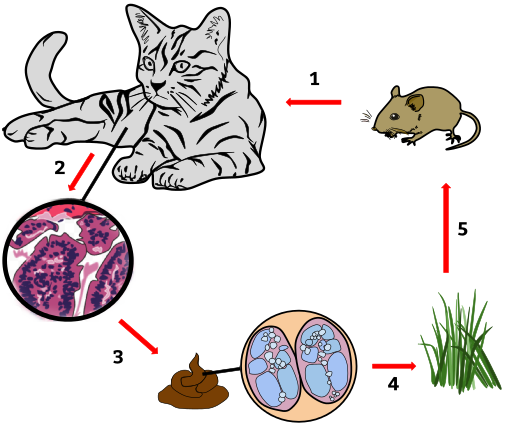Cleanliness is next to Godliness, that's the saying I guess. You see, living in good, and proper hygiene is really not a difficult process. According to health direct, It just involves daily cleaning of the body, properly washing the hands with soap after doing dirty works, going to the toilet, or before cooking, brushing twice daily, putting on gloves when taking are of pet feces, washing your hands after handling pets, properly cutting your nails, and more. When we are asked to do the right things, sometimes it can look like a lot, but you see, when you do not do these things, you could end up paying the price for disobedient. In this case, we will be looking at one of the prices to pay, which is being diagnosed with Toxoplasmosis.

Toxoplasmosis is a disease causes by an obligate intracellular parasite, Toxoplasma gondii. Toxoplasmosis, amongst other diseases such as Chagas disease, and Cyclosporiasis are diseases labeled as priorities for public health action according to Center for Disease Control, due to the Number of infected people. Also, more than 40 million people in the United States are carriers of the parasite without no symptoms of being sick displayed by the hosts, and according to a study published in the National Library of Medicine, over 6 billion people are infected with this parasite. It is no doubt that a lot of people have been infected with this parasite or are even carriers of the parasite without knowing, a study in Nigeria shows that 23.9%, of the people living in Maiduguri, the capital city of Borno state.
Contracting the Toxoplasmosis infection by human could occur in four ways, which are;
Foodborne Transmision (which could include ingesting of cysts of the from infected unpasturized dairy product, undercooked/raw meat, contaminated water, from surfaces of unwashed fruits and vegetables). Zoonotic Transmission (ingesting the parasite from contaminated water with food with feline feces, especially cats that feed on meat could be carrying the parasite). Vertical transmission (as in mother to child through the placenta) Transmission from blood transfusion or organ transplant.
It All Starts From Somewhere

An article written by Center For Disease Control, explains the life cycle of Toxoplasma gondii. It is said to infest virtually all warm-blooded mammals and bird but while infesting them, it stays in their body as intermediate hosts. According to an article on NCBI, Warm-blooded mammals and birds are regarded as intermediate host because at this point, Toxoplasma gondii is in the asexual stage, but it begins its sexual stage when it is in the gastrointestinal tract of the Family Felidae which are its definitive hosts. During its lyife cycle, it can infect its host's cells in three stages, which are; the Tachyzoite, Bradyzoite, and Sporozoite stages . The cycle begins with the unsporulated oocystes of 1 to 3 weeks are being passed out along with Feline feces. After its introduction to the environment, the Oocysts sporulates in 1 to 5 days after which birds, and rodents ingest them while feeding from the soil and from bodies of fruits, plant, water, and other edibles. Once the oocyst have been inhested, they turn into Tachyzoite (often found in acute infections) which stays in the muscle tissue of the intermediate host, developing into Bradyzoites (a tissue cyst,usually common in chronic infection), Humans, can also ingest any of these making the cysts live in its system but asexually. Cats are often infected with by the cysts when they feed on infested tissues and the cyst becomes sporozoites which are sexual, so the life cycle can continue (Intech open).
Toxoplasma gondii Comes Bearing Gifts
While in most cases, people with strong immune system, even when infected with the parasite would remain asymptomatic but in cases where the infection becomes symptomatic to both people who are immono-competent and immunocompromised, what can be expected.
Since the parasite comes bearing a lot of gifts, infected people could suffer from Ocular toxoplasmosis/retinochoroiditis, causing retina lesions as a result of the cysts deposit on the Retina. It is often characterized with eye pain, decreased visual acuity and foggy appearances (NCBI). Treatment could take a long time as 5 years, and according to a study published in the National Library of Medicine, 1 out of every 4 patients with Ocular toxoplasmosis lose one eye, and 1 out of 5 patients have a reoccurrence.
Another gift could be Congenital toxoplasmosis, usually associated with fetuses. It is transmitted from mother to fetus, leading to complications in birth or miscarriage. Fetus are often infected with this parasite in the first trimester of pregnancy, and research showed that 9% of children born in the United States with this congenital toxoplasmosis suffer visual impairment.
Toxoplasmic encephalitis is a gift that doesn't come with baggage. It affects the Central nervous system of immunocompromised patients. This disease occur as a result of reactivating a latent Toxoplasma gondii in the patient.
Prevention and Cure (although Prevention is better)
Proper hygiene at home will help to reduce the transmission of Toxoplasma gondii. Properly washing vegetables, fruits, meat, and cooking food (especially meat) properly. Avoid meats that are not properly cooked, use gloves when working in the garden and wash the hands immediately after the exercise . Pregnant women should do test at their first trimester, to be sure their fetus are not infected with Toxoplasmosis, and be treated immediately if such occur.
In immunocompromised patients such as AIDS patients, it would require several combinations of medications to boost their system, while treating the parasite. Their blood cells should be monitored regularly to prevent other diseases .
Conclusion
While people with a strong immune system can be infected with Toxoplasmosis and not show any symptoms, it is better not to be infected at all. There is no free lunch when it comes to Toxoplasma gondii. If a woman is asymptomatic before getting pregnant, pregnancy would put the child in danger, and the mother, at that point, becomes immunocompromised. It is better to always visit the hospital if you see any symptoms and do all necessary test as a woman during Antenatal care. Symptoms could include eye pain, sensitivity to light in cases of infections to the eye, blurred vision, injury to the retina, fever, sore throat, jaundice, and many more.
I heard it recommended that pregnant women shouldn't come into contact with cats at all during pregnancy.
It is basically as a result of Toxoplasmosis, which can be carried by cats. Pregnant women just need to be careful around cats, remember they are immunocompromised.
Congratulations @eni-ola! You have completed the following achievement on the Hive blockchain and have been rewarded with new badge(s):
Your next target is to reach 700 replies.
You can view your badges on your board and compare yourself to others in the Ranking
If you no longer want to receive notifications, reply to this comment with the word
STOPSupport the HiveBuzz project. Vote for our proposal!
dealing with protists is always not fun!!
!1UP
Click this banner to join "The Cartel" discord server to know more.
Never fun at all. Thanks a lot for reading through, I am grateful.
You have received a 1UP from @gwajnberg!
@stem-curator, @neoxag-curator
And they will bring !PIZZA 🍕. The @oneup-cartel will soon upvote you with:
Learn more about our delegation service to earn daily rewards. Join the Cartel on Discord.
Thanks for your contribution to the STEMsocial community. Feel free to join us on discord to get to know the rest of us!
Please consider delegating to the @stemsocial account (85% of the curation rewards are returned).
Thanks for including @stemsocial as a beneficiary, which gives you stronger support.
Washing food, washing hands: these are good practices, essential practices--not only to prevent infection with toxoplasmosis, but to prevent infection with any pathogen/parasite. In the U. S. cats are popular pets. Fear of toxoplamosis is not likely to change that, but pregnant women do tend to avoid cats. Wouldn't it be wise to have the cat, or cat feces tested in a home? Wouldn't that help to keep the family safe from a pet, before a human is infected?
Great article. Reminding us to wash hands (wash everything!) in the age of COVID especially is a good idea. Thank you.